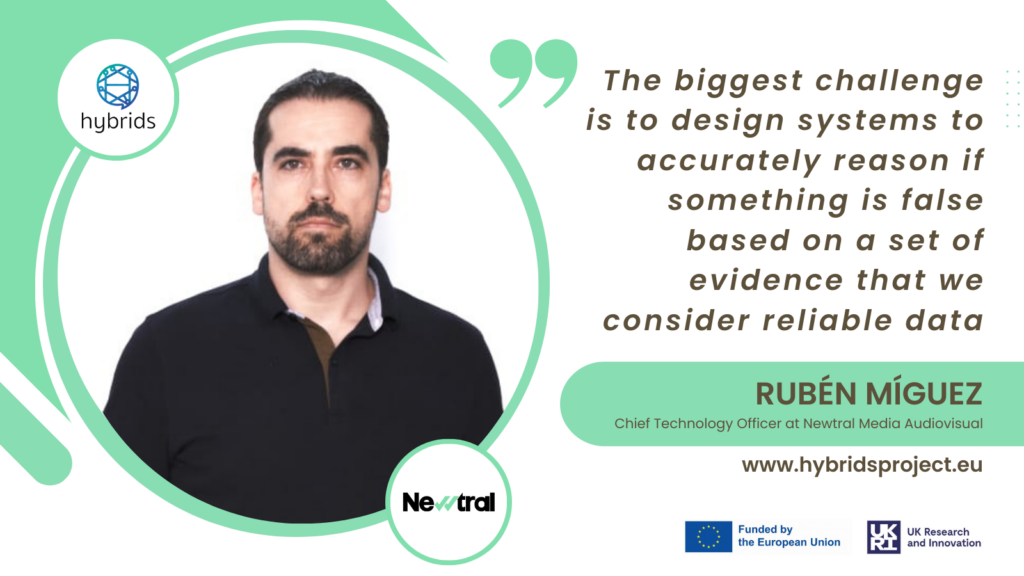By Maria Campins, Newtral
Rubén Míguez is the Chief Technology Officer at Newtral Media Audiovisual (Spain) and member of HYBRIDS. He has been working at Newtral since 2018, and he is the leader of a team that has developed solutions based on artificial intelligence for the automation of fact-checking and fighting disinformation. Within this field, he has participated in the Big Things Conference in 2019 and in the Global Fact 9 presenting Newtral’s solutions. Míguez is going to supervise a Ph.D. project on claim verification for fact-checking.
Throughout the HYBRIDS initiative, the acronym of Hybrid Intelligence to monitor, promote and analyse transformations in good democracy practices, Newtral and other 13 institutions will collaborate in the following years to promote different approaches on the basis of an exhaustive analysis of public discourse about crucial global issues, such as health, climate crisis, European scepticism or immigration, which will take into account both traditional media and content published through social networks.
How can artificial intelligence and human-in-the-loop approaches fight disinformation?
They are an essential tool to combat the disinformation problem we have. We need more efficient strategies to bring human knowledge into the models and mechanisms we currently use to detect intentional disinformation attacks.
How can hybrid intelligence systems overcome the shortcomings of existing artificial intelligence methods?
One of the main problems of purely automated systems is their inability to adapt to new situations for which they have not been trained. By including humans in decision-making processes, this problem is minimised, and it becomes possible to apply human context and judgement when necessary, while machines take care of the more labour-intensive tasks. The application of hybrid intelligence systems can also improve one of the great unfinished tasks of current systems, their explainability, which can improve end-users’ confidence in these technologies and facilitate their adoption.
Which questions do you want to solve through the Ph.D. student assigned? What are some of the challenges you face in your research?
The main challenge that the Ph.D. in this position will face will be the semi-automated detection and verification of disinformation narratives. The biggest technological challenge is to be able to design and build systems sophisticated enough to accurately reason whether something is false based on a set of evidence that we consider reliable data. What is reliable? How can we make a machine have enough contextual information to reason in a way that is similar to how a human would?
What are the most promising lines of research?
The use of large, pre-trained language models, recently made fashionable with the emergence of ChatGPT/GPT-4, and their ability to perform simple reasoning is a first step forward in this line of work.
What do you aim to achieve with HYBRIDS?
Our main interest in participating in a network of researchers as multidisciplinary as HYBRIDS is to identify new perspectives and potential solutions to problems that are difficult to address from a purely technical point of view. The active collaboration between the members of the network in a problem as complex as disinformation is a differential element for the construction of real solutions that can help us to advance in the war against disinformation.

